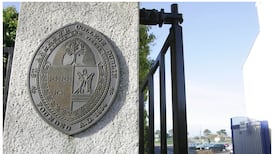There was an interesting problem on the Daily Telegraph’s agony aunt page the other day, in which a concerned mother in London worried that her teenage son was turning “Irish”.
His condition should have been foreseeable. The mother herself was half Irish, on her father’s side, so the teenager was in high-risk group for developing symptoms. But now he had started using the Irish version of his name and making critical comments about “the British”, both of which habits were said to “irritate his [English] dad”.
The letter was headlined: “Could my son’s fixation with his Irish heritage be offensive?” And clearly, from the father’s point of view, the answer was yes. But on closer inspection, unusually for the Telegraph, the issue of concern was whether he might annoy Irish people, of the born-in-Ireland variety.
He hoped to attend university here, his mother added, in preparation for which he was immersing himself in Irish history, literature and music, and even learning Irish on Duolingo. Her fear was that this might rub the natives up the wrong way: “I don’t want him to offend anyone or get in any trouble, whether by signalling that he is a more fluent Irish speaker than he is likely to be even after several more months’ Duolingo, or simply coming across as rather less Irish than he thinks he is.”
READ MORE
When she put this to him, however, he had dismissed it with a cheerful: “Sure I’ll be grand.”
The Irishness problem shared a page with a (slightly) more conventional query, headlined: “I worry I’ll lose my long-term girlfriend if I say no to polyamory.” For those of you who don’t get out much, I should perhaps explain that the practice referred to there is consensual relationships involving three or more partners.
I might also add in passing that “Polly Amory” would be an excellent name for an agony aunt. On which note, allow me to correct my earlier description of the Telegraph feature, which is actually presided over by an agony uncle: Richard Madeley, the breakfast television presenter.
Celebrity watchers among you will know that Madeley is married to one Judy Finnigan – they used to present the Richard and Judy show. And as luck would have it, she has Irish heritage. So the couple themselves may well have experienced at least mild outbreaks of their children being Irish on occasion.
In any case, Madeley was reassuringly upbeat about the plight of the concerned London mother. He began by marvelling at the teenager’s command of Hiberno-English: “’Sure I’ll be grand.’ Did he really say that? Wonderful!”
Then he diagnosed the youngster’s condition in romantic terms: “Your boy is in love. In love with the notion of Irishness, as well he might be – its charms, language, history and culture, and he’s proud of his deep familial roots there.”
As for the risk of him offending anyone here, Madeley thought this minimal. “Anyway, the reality of university life will knock a lot of the earnest playacting out of him,” he said.
We are indeed well used in this country to visitors outdoing us in the performative aspects of Irishness. The Normans started it, becoming famously “more Irish than the Irish themselves” and launching the Eight Hundred Years of Impressionism.
But it remains a competitive field today. Irish dancing is dominated by Americans. German and Dutch visitors often have a deeper feeling for the country than those of us born here. Japanese tourists have been known to learn our notoriously difficult mother language in jig time while, speaking of jig-time, playing fiddle and uilleann pipes in the pub after classes.
Perhaps oppressed by the sheer weight of responsibility involved in being Irish, meanwhile, the rest of us sometimes struggle to match the enthusiasm of part-time practitioners.
I’m reminded of a column Myles na gCopaleen of this parish wrote once, wherein he claimed to have cured himself of any national feeling (“I am no longer Irish. I am merely a person now.”) and, assuming the role of agony uncle, promised to help others who wrote to him in confidence.
Perhaps exaggerating the known symptoms then (it was 1943), he presented sufferers with a questionnaire: “When did you have your first fight? At what age did you make your first brilliant witticism? At what age did you become a drunkard?” These and other confessions were to be sent in an envelope marked “Irish” on the top corner. I wonder how big his postbag was that week?
In suggesting the Normans were the first to outperform the natives, by the way, I was forgetting the dark ages and a man whose face used to be on the Irish £5 note.
A brilliant philosopher of the 9th century, John Scotus Eriugena (815 – 877AD) was born on this island. But his name derived from two different names for Ireland, Scotia and Ériu. It can only have been to acknowledge overseas competition from the offspring of our emigrating monks and scholars that, for clarity, he had to be known as “Irish Irish John”, or “John, the Irishman from Ireland”.













